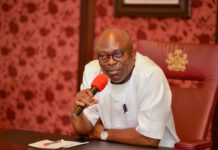 Varsity teachers begin strike today
Varsity teachers begin strike today
NIGERIANS holding the short end of the stick seem near their wits end now. The unraveling ogre of anomie on all fronts is enervating to say the least. Armed banditry and insecurity, unemployment and poverty, poor power supply and low capacity utilisation by industries, kidnapping for ransom and trepidations over fuel subsidy removal, all and more combine to set both the rulers and the ruled on edge.
Jigawa State Governor, Sule Lamido, in an interview with The Guardian, put it succinctly: “There is a disconnection between the people and the leadership, hence the leaders have no capacity to motivate or to inspire the people or restore confidence. Because of this disconnection, our institutions have collapsed. I thought it was bad enough that our public institutions alone were collapsing, but with the story of the failure of banks making the rounds, I am now alarmed.”
But Lamido also said: “If the average Nigerian wants the roads repaired, power supply regular, he will need to make some sacrifices. The choice is ours. The President is talking to people, political leaders, and opinion molders about the reality of the situation.”
In fact, The Guardian can confirm that the there are several high-level official meetings going on, especially at the Presidency, to square up to these challenges nationwide.
Some of the critical stakeholders engaged in the current efforts to stem the nation’s slide include security experts, religious and political leaders as well as civil society groups and media chieftains.
However, in a development that seems to be the first breech of the strained dam, the Academic Staff Union of Universities (ASUU) yesterday called out it members in universities nationwide for “a total, comprehensive and indefinite industrial action from today.”
There was palpable fear yesterday that the ASUU strike might open a floodgate of similar actions by other trade unions in the country.
National President, ASUU Prof. Ukachukwu Awuzie, said “the painful but avoidable decision had been precipitated by Federal Government’s show of lack of faith to agreements mutually reached with the union.”
Awuzie, alongside other executive members of the ASUU stated this in Port Harcourt, yesterday after a crucial meeting called to review the situation in Nigerian universities.
In fact, ASUU has also stated that it was working in conjunction with other labour unions across the country to resist the current administration’s “unpopular proposed policies such as the removal of subsidy from petrol.”
According to Awuzie, “in recent months, the Federal Government has intensified its campaign for devaluation, privatisation and petroleum price increase, which the Nigerian labour movement, including ASUU, shall resist.
“The World Bank and IMF were decisive in sponsorship and constitution of the Economic Team, which was put in place following the inauguration of Mr. President after the April 2011 elections.
“The ruling class has failed. It cannot provide jobs, education, healthcare, affordable transportation, roads and so on. It is incapable of uniting the people; it uses ethnic origin as a political weapon. The ruling class violates the integrity of the Judiciary. The faction in power, with President Jonathan as head, is unable to protect the people from hunger, robbery, murder of innocent citizens and generalised insecurity. Politically, Nigeria is in a precarious position in spite of the 2011 general elections.”
Youth unemployment is no doubt one of the biggest problems threatening the body-politic.According to the National Bureau of Statistics, recent statistics showed that unemployment rate in Nigeria increased to 23.9 per cent during the first half of the year.
In addition to the already daunting statistics of over 43 million unemployed youth, an additional 1.8 million people joined the labour market recently.
The Bureau attributed the rise in the ranks of the nation’s unemployed to fresh entrants to the job market and worker layoffs across all sectors of the economy in the course of the year.
The crime wave across the country is giving citizens sleepless nights. Kidnapping gangs appear to have made the South-East and South-South their fiefdom. Banks in the South-west are currently operating under a climate of fear. Only last week, they virtually shut shops in Ogun State following a wave of deadly armed attacks with promise of more from dare-devil robbers.
The propensity for violent conflicts and attacks has also not abated in the North. Every incident in that area of the country now has continued to be ascribed to the outlawed Boko Haram sect, even as citizens fear that several criminal groups now abound in the area.
Expectedly, the situation has impacted on the general human security of the people, promoting fear and limiting the peoples’ ability to develop economically.
ASUU President, Awuzie, who read a 12-page statement went over the series of interaction the union had had with the Federal Government on issues bordering on saving the university system from collapse and institutionalising global standard practices of knowledge culturing, described as “saddening” government’s failure to adhere to decisions reached since 2001.
He said the Federal Government’s failure to honour the 2009 FGN/ASUU Agreement and disregarded for the two months of grace the union gave the government to show faith on the agreement smacked of insensitive.
His words: “NEC, having noted that the Federal Government neglected, ignored, failed and refused to implement the core components of the 2009 FGN/ASUU Agreement after more than two years of its signing.
“Having squandered two months it requested without achieving any progress in the implementation of the agreement, having sacked the Implementation Monitoring Committee that served as the forum for dialogue with ASUU on this dispute, ASUU is convinced that the government is terribly insincere and is manifestly unwilling to genuinely implement the agreement it freely entered into with the union.
“Therefore, ASUU resolved, painfully, to direct all members of ASUU in all branches nationwide to proceed on a total, comprehensive and indefinite strike, beginning from the midnight of Sunday, 4th December, 2011.
He explained that “for the avoidance of doubt, a total, comprehensive and indefinite strike means: no teaching, no examination, no grading of script, no project supervisions, no inaugural lectures, no appointment and promotion meeting, no statutory meetings (Council, Senate, Board etc) or other meetings directed by government or their agents.”
Awuzie lamented that Nigeria’s economy had been taken over by foreign interests. He also described President Goodluck Jonathan’s economic team as a representative of the World Bank and the International Monetary Fund (IMF).
He faulted the government’s economic programme, including the proposed removal of fuel subsidy, labelling it “anti-people.”
ASUU also observed that the ruling class in Nigeria had failed to meet the people’s need in terms of provision of basic social infrastructure.



